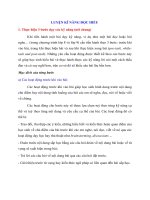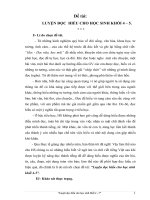TH luyen doc hieu 7
Bạn đang xem bản rút gọn của tài liệu. Xem và tải ngay bản đầy đủ của tài liệu tại đây (112.17 KB, 5 trang )
PASSAGE 07
►Read the following passage and mark the letter A, B, C or D on your answer sheet to
indicate the correct answer to each of the questions from 1 to 10.
It's often said that we learn things at the wrong time. University students frequently do the minimum
of work because they're crazy about a good social life instead. Children often scream before their piano
practice because it’s so boring. They have to be given gold stars and medals to be persuaded to swim, or
have to be bribed to take exams. But the story is different when you’re older.
Over the years, I've done my share of adult learning. At 30, I went to a college and did courses in
History and English. It was an amazing experience. For starters, I was paying, so there was no reason to
be late - I was the one frowning and drumming my fingers if the tutor was late, not the other way round.
Indeed, if I could persuade him to linger for an extra five minutes, it was a bonus, not a nuisance. I wasn't
frightened to ask questions, and homework was a pleasure not a pain. When I passed an exam, I had
passed it for me and me alone, not for my parents or my teachers. The satisfaction I got was entirely
personal
Some people fear going back to school because they worry that their brains have got rusty. But the
joy is that, although some parts have rusted up, your brain has learnt all kinds of other things since you
were young. It has learnt to think independently and flexibly and is much better at relating one thing to
another. What you lose in the rusty department, you gain in the maturity department.
In some ways, age is a positive plus. For instance, when you're older, you get less frustrated.
Experience has told you that, if you're calm and simply do something carefully again and again,
eventually you'll get the hang of it. The confidence you have in other areas - from being able to drive a
car, perhaps - means that if you can’t, say, build a chair instantly, you don't, like a child, want to destroy
your first pathetic attempts. Maturity tells you that you will, with application, eventually get there.
I hated piano lessons at school, but I was good at music. And coming back to it, with a teacher who
could explain why certain exercises were useful and with musical concepts that, at the age of ten, I could
never grasp, was magical. Initially, I did feel a bit strange, thumping out a piece that I'd played for my
school exams, with just as little comprehension of what the composer intended as I'd had all those years
before. But soon, complex emotions that I never knew poured out from my fingers, and suddenly I could
understand why practice makes perfect.
(Đề thi tuyển sinh đại học năm 2010)
Question 1: It is
implied in paragraph 1 that _______.
A.
young learners are usually lazy in their class
B.
teachers should give young learners less homework
C.
young learners often lack a good motivation for learning
D.
parents should encourage young learners to study more
Question 2:
A.
The writer's main point in paragraph 2 is to show that as people grow up, ________.
they cannot learn as well as younger learners
B.
they have a more positive attitude towards learning
C.
they tend to learn less as they are discouraged
D.
they get more impatient with their teachers
Question 3: The phrase
"For starters" in paragraph 2 could best be replaced by
"___________"
A. For beginners
B. First and foremost
C. At the starting point
Question 4: While doing
D. At the beginning
some adult learning courses at a college, the writer was surprised ___________.
A, to have more time to learn
B. to be able to learn more quickly
C. to feel learning more enjoyable
D. to get on better with the tutor
Question 5: In paragraph 3, the word "rusty" means
A. not as good as it used to be through lack of practice
B. impatient because of having nothing to do
C. covered with rust and not as good as it used to be
D.
staying alive and becoming more active
Question 6: The phrase "get there" in paragraph 4 is closest in meaning to "_______".
A. have the things you have long desired
B. achieve your aim with hard work
C. arrive at an intended place with difficulty
D. receive a school or college degree
Question 7: All of the following are true about adult learning EXCEPT.
A. experience in doing other things can help one's learning
B. young people usually feel less patient than adults
C. adults think more independently and flexibly than young people
D. adult learners have fewer advantages than young learners
Question 8: It can be inferred from paragraph 4 that maturity is a positive plus in the learning process
because adult learners ___________ .
A. pay more attention to detail than younger learners
B. have become more patient than younger learners
C. are less worried about learning than younger learners
D. are able to organize themselves better than younger learners
Question 9: It is implied in the last paragraph that when you learn later in life, you _________.
A. should expect to take longer to learn than when you were younger
B. find that you can recall a lot of things you learnt when younger
C. can sometimes understand more than when you were younger
D. are not able to concentrate as well as when you were younger.
Question 10: What is the writer's main purpose in the passage?
A. To show how fast adult learning is.
B. To describe adult learning methods.
C. To encourage adult learning.
D. To explain reasons for learning.
ĐÁP ÁN
PASSAGE 07
Question 1: Đoạn 1 ám chỉ rằng
A. những người trẻ thường lười khi trên lớp
B. giáo viên nên cho những người học trẻ ít bài tập về nhà
C. những người học ở độ tuổi còn trẻ thường thiếu động lực học tập
D. bố mẹ nên khuyến khích con cái học nhiều hơn
University students frequently do the minimum of work because they're crazy about a good sociallife
instead Children often scream before their piano practice because it's so boring. They have to be given gold
stars and medals to be persuaded to swim, or have to be bribed to take exams (Các sinh viên đại học thường
làm khối lượng bài tập tối thiểu… trẻ em la hét khi đến giờ học piano... chúng được tặng sao hoặc huy
chương vàng để thuyết phục chúng đi bơi... hoặc hối lộ để làm bài kiểm tra… Tất cả chứng tỏ những người
học trẻ khơng tìm thấy động lực để cố gắng học tập)
=> C
Question 2:
At 30, I went to a college and did courses in History and English. It was an amazing experience… I
wasn't frightened to ask questions, and homework was a pleasure not a pain... The satisfaction I got was
entirely personal.
Ý của tác giả ở đoạn 2 muốn chỉ rõ khi người ta trưởng thành, thái độ đối với việc hoc tập càng trở nên
tích cực hơn.
=> B
Question 3:
For starters: (informal) used to emphasize the first of a list of reasons, opinions, etc., or to say what
happens first - được sử dụng để nhấn mạnh điều đầu tiên của 1 lí do, ý kiến... hoặc để nói điều gì xảy ra
trước tiên (theo từ điên Oxford Learner's Dictionary) = First and foremost: đầu tiên và trước hết
=> B
Question 4:
While doing some adult learning courses at a college, the writer was surprised _______. Trong khi
tham gia các khóa học cho người lớn ở trường đại học, tác giả ngạc nhiên :
It was an amazing experience... The satisfaction I got was entirely personal. (sự hài lịng thỏa mãn
hồn tồn cho bản thân)
=> C
Question 5:
rusty (adj): not as good as it used to be, because you have not been practising - khơng được tốt như
ban đầu/ bị hao mịn, giảm sút (theo từ điển Oxford Learner's Dictionary)
=> A
Question 6:
Experience has told you that, if you're calm and simply do something carefully again and again,
eventually you'll got the hang of it. Maturity tells you that you will, with application, eventually get there.
(Nếu như bạn bình tĩnh và làm đi làm lại cái gì 1 cách cẩn thận, cuối cùng bạn cũng biết cách làm nó. Sự
trưởng thành nói cho bạn biết rằng, với sự thực hành, cuối cùng bạn cũng sẽ đạt đươc mục đích)
=> B
Question 7:
A. Kinh nghiệm khi làm những thứ khác có thể giúp việc học hành. (Maturity tells you that you will
with application, eventually get there. – sự trưởng thành nói rằng, bằng cách thực hành, bạn cuối
cùng cũng đat được muc đích mình muốn)
B. Người trẻ tuổi thường cảm thấy thiếu kiên nhẫn hơn người lớn. (đoạn 1)
C. Những người trưởng thành suy nghĩ độc lập và linh hoat hơn người trẻ tuổi. (Đúng: although some
parts have rusted up, your brain has learnt all kinds of other things since you were young. It has
learnt to think independently and flexibly and is much better at relating one thing to another. - mặc
dù 1 vài phần đã kém hơn... những não bộ của bạn đã học cách để nghĩ một cách độc lập và linh
hoat hơn...)
D.
Những người học ờ tuổi trưởng thành có ít ưu thế hơn những người học trẻ tuổi (Sai vì: In
some ways, age is a positive plus. - trong 1 số trường hợp, tuổi tác lại là một lợi thế...)
=> D
Questions 8:
It can be inferred from paragraph 4 that maturity is a positive plus in the learning process because adult
learners _______. Có thể suy luận từ đoạn 4 rằng sự trưởng thành là một ưu thế trong quá trình học vì những
người học ở tuổi trưởng thành:
For instance, when you're older, you get less frustrated. Experience has told you that, if you're calm
and simply do something carefully again and again, eventually you'll get the hang of it. (Khi bạn già hơn,
bạn ít nản chí hơn... nếu bạn bình tĩnh làm đi làm lại một thứ cẩn thận, cuối cùng bạn cũng đạt được nó. =>
Điếu đó chứng tỏ rằng người học ở tuổi trưởng thành kiên nhẫn hơn những người trẻ tuổi)
=> B
Question 9:
Đoạn cuối ám chỉ rằng khi bạn học muộn hơn, bạn
A. mất nhiểu thời gian để học hơn khi bạn còn trẻ
B. thấy rằng bạn có thể nhớ rẩt nhiều thứ bạn đã học khi cịn trẻ
C. đơi lúc có thể hiểu nhiều hơn khi bạn còn trẻ
D. khơng thể tập trung tốt như khi bạn cịn trẻ,
…… But soon, complex emotions that I never knew poured out from my fingers, and suddenly I could
understand why practice makes perfect, (ngay sau đó, những cảm xúc phức tạp tơi chưa từng biết dàn trải
trên những ngón tay, và bất chợt tôi hiểu tại sao sự thực hành mang lại sự hoàn hảo)
=> C
Question 10:
Trong bài viết, tác giả chủ yếu nói đến việc học ở tuổi trưởng thành: đặc điểm, khó khăn và lợi thế
nhằm khuyến khích việc học khi lớn tuổi.
=> C









